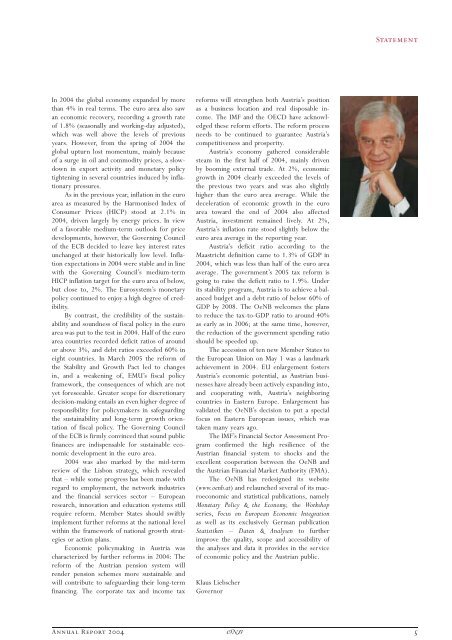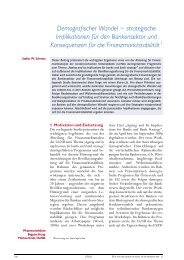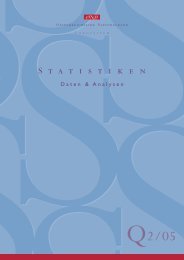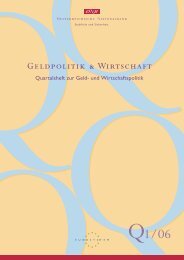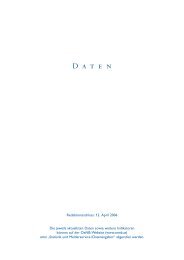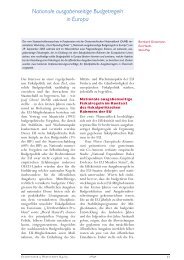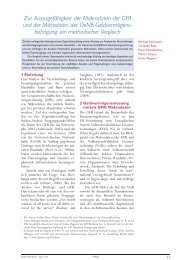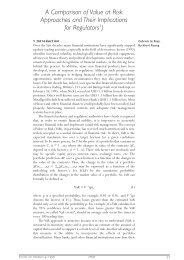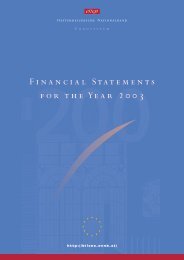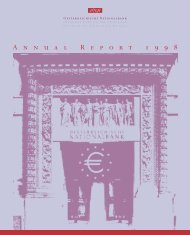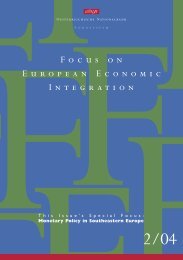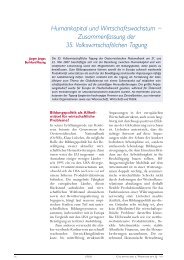Create successful ePaper yourself
Turn your PDF publications into a flip-book with our unique Google optimized e-Paper software.
In <strong>2004</strong> the global economy expanded by more<br />
than 4% in real terms. The euro area also saw<br />
an economic recovery, recording a growth rate<br />
of 1.8% (seasonally and working-day adjusted),<br />
which was well above the levels of previous<br />
years. However, from the spring of <strong>2004</strong> the<br />
global upturn lost momentum, mainly because<br />
of a surge in oil and commodity prices, a slowdown<br />
in export activity and monetary policy<br />
tightening in several countries induced by inflationary<br />
pressures.<br />
As in the previous year, inflation in the euro<br />
area as measured by the Harmonised Index of<br />
Consumer Prices (HICP) stood at 2.1% in<br />
<strong>2004</strong>, driven largely by energy prices. In view<br />
of a favorable medium-term outlook for price<br />
developments, however, the Governing Council<br />
of the ECB decided to leave key interest rates<br />
unchanged at their historically low level. Inflation<br />
expectations in <strong>2004</strong> were stable and in line<br />
with the Governing CouncilÕs medium-term<br />
HICP inflation target for the euro area of below,<br />
but close to, 2%. The EurosystemÕs monetary<br />
policy continued to enjoy a high degree of credibility.<br />
By contrast, the credibility of the sustainability<br />
and soundness of fiscal policy in the euro<br />
area was put to the test in <strong>2004</strong>. Half of the euro<br />
area countries recorded deficit ratios of around<br />
or above 3%, and debt ratios exceeded 60% in<br />
eight countries. In March 2005 the reform of<br />
the Stability and Growth Pact led to changes<br />
in, and a weakening of, EMUÕs fiscal policy<br />
framework, the consequences of which are not<br />
yet foreseeable. Greater scope for discretionary<br />
decision-making entails an even higher degree of<br />
responsibility for policymakers in safeguarding<br />
the sustainability and long-term growth orientation<br />
of fiscal policy. The Governing Council<br />
of the ECB is firmly convinced that sound public<br />
finances are indispensable for sustainable economic<br />
development in the euro area.<br />
<strong>2004</strong> was also marked by the mid-term<br />
review of the Lisbon strategy, which revealed<br />
that — while some progress has been made with<br />
regard to employment, the network industries<br />
and the financial services sector — European<br />
research, innovation and education systems still<br />
require reform. Member States should swiftly<br />
implement further reforms at the national level<br />
within the framework of national growth strategies<br />
or action plans.<br />
Economic policymaking in Austria was<br />
characterized by further reforms in <strong>2004</strong>: The<br />
reform of the Austrian pension system will<br />
render pension schemes more sustainable and<br />
will contribute to safeguarding their long-term<br />
financing. The corporate tax and income tax<br />
reforms will strengthen both AustriaÕs position<br />
as a business location and real disposable income.<br />
The IMF and the OECD have acknowledged<br />
these reform efforts. The reform process<br />
needs to be continued to guarantee AustriaÕs<br />
competitiveness and prosperity.<br />
AustriaÕs economy gathered considerable<br />
steam in the first half of <strong>2004</strong>, mainly driven<br />
by booming external trade. At 2%, economic<br />
growth in <strong>2004</strong> clearly exceeded the levels of<br />
the previous two years and was also slightly<br />
higher than the euro area average. While the<br />
deceleration of economic growth in the euro<br />
area toward the end of <strong>2004</strong> also affected<br />
Austria, investment remained lively. At 2%,<br />
AustriaÕs inflation rate stood slightly below the<br />
euro area average in the reporting year.<br />
AustriaÕs deficit ratio according to the<br />
Maastricht definition came to 1.3% of GDP in<br />
<strong>2004</strong>, which was less than half of the euro area<br />
average. The governmentÕs 2005 tax reform is<br />
going to raise the deficit ratio to 1.9%. Under<br />
its stability program, Austria is to achieve a balanced<br />
budget and a debt ratio of below 60% of<br />
GDP by 2008. The OeNB welcomes the plans<br />
to reduce the tax-to-GDP ratio to around 40%<br />
as early as in 2006; at the same time, however,<br />
the reduction of the government spending ratio<br />
should be speeded up.<br />
The accession of ten new Member States to<br />
the European Union on May 1 was a landmark<br />
achievement in <strong>2004</strong>. EU enlargement fosters<br />
AustriaÕs economic potential, as Austrian businesses<br />
have already been actively expanding into,<br />
and cooperating with, AustriaÕs neighboring<br />
countries in Eastern Europe. Enlargement has<br />
validated the OeNBÕs decision to put a special<br />
focus on Eastern European issues, which was<br />
taken many years ago.<br />
The IMFÕs Financial Sector Assessment Program<br />
confirmed the high resilience of the<br />
Austrian financial system to shocks and the<br />
excellent cooperation between the OeNB and<br />
the Austrian Financial Market Authority (FMA).<br />
The OeNB has redesigned its website<br />
(www.oenb.at) and relaunched several of its macroeconomic<br />
and statistical publications, namely<br />
Monetary Policy & the Economy, the Workshop<br />
series, Focus on European Economic Integration<br />
as well as its exclusively German publication<br />
Statistiken — Daten & Analysen to further<br />
improve the quality, scope and accessibility of<br />
the analyses and data it provides in the service<br />
of economic policy and the Austrian public.<br />
Klaus Liebscher<br />
Governor<br />
Statement<br />
<strong>Annual</strong> <strong>Report</strong> <strong>2004</strong> ×<br />
5


